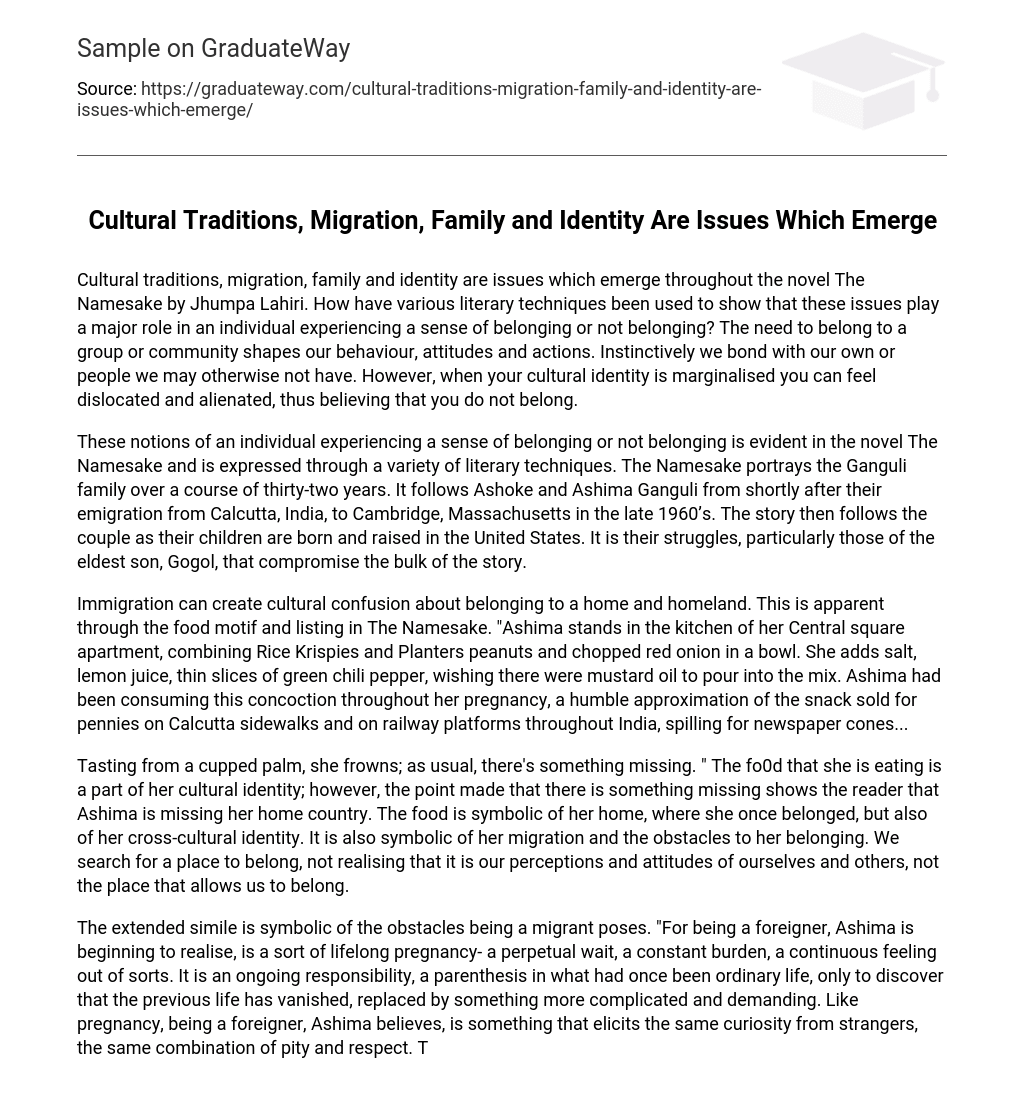The novel The Namesake by Jhumpa Lahiri explores cultural traditions, migration, family, and identity and their impact on an individual’s sense of belonging. Literary techniques are used to highlight the significance of these issues in shaping one’s perception of belonging. The desire to belong to a particular group or community influences our behavior, attitudes, and actions. We naturally form connections with individuals who share our background or those who we might not have acquainted otherwise. Nevertheless, when one’s cultural identity is overshadowed or devalued, they can feel out of place and disconnected, leading to a belief that they do not belong.
The novel The Namesake explores the theme of belonging through various literary techniques. It portrays the Ganguli family over a span of thirty-two years, following Ashoke and Ashima Ganguli’s journey from Calcutta, India to Cambridge, Massachusetts in the late 1960s. The narrative then focuses on their children’s upbringing in the United States, with a particular emphasis on the challenges faced by their eldest son, Gogol.
The combination of Rice Krispies, Planters peanuts, and chopped red onion in a bowl is prepared by Ashima in the kitchen of her Central square apartment. She enhances the flavor by adding salt, lemon juice, and thin slices of green chili pepper. Ashima expresses a desire for mustard oil to include in the mix, as she recalls consuming this unique concoction during her pregnancy. This humble approximation of a popular snack, commonly sold for pennies on Calcutta sidewalks and railway platforms throughout India, evokes a sense of cultural connection and nostalgia for Ashima.
Tasting from a cupped palm, she frowns; as usual, something is lacking. It is evident that the food she is consuming represents her cultural identity. However, her expression conveys that Ashima yearns for her home country. This food symbolizes not only her homeland, where she formerly felt a sense of belonging, but also her bicultural identity. Additionally, it signifies her migration and the hurdles she faces in establishing a sense of belonging. Often, we search for a place to fit in without realizing that it is our own perceptions and attitudes toward ourselves and others, rather than the physical location, that determine our sense of belonging.
The extended simile symbolizes the challenges faced by migrants. According to Ashima, being a foreigner is like a lifelong pregnancy – a perpetual wait, a constant burden, a continuous feeling of being out of place. It is an ongoing responsibility, interrupting what used to be an ordinary life and replacing it with something more complex and demanding. Like pregnancy, being a foreigner evokes curiosity, as well as a mix of pity and respect from strangers. This simile, along with the use of dashes and a list, reveals Ashima’s confusion about where she truly belongs. One’s attitude towards belonging can change over time. Ashoke, Ashima, and their children gradually assimilate into American culture. This is demonstrated through the incorporation of food motifs and the juxtaposition of experiences. They learn to prepare turkey for Thanksgiving, but with a blend of garlic, cumin, and cayenne. They hang a wreath on their door in December and wrap woolen scarves around snowmen. They color boiled eggs violet and pink for Easter and hide them around the house.
For the sake of Gogol and Sonia, the Ganguli family celebrates the birth of Christ with increasing fanfare, unlike their traditional worship of Durga and Saraswati. Ashoke and Ashima undergo a change in their attitude towards belonging, as they embrace assimilation for the sake of their American-born children. Belonging can be formed through connections with people, places, groups, communities, and the larger world. The Ganguli family finds a strong sense of belonging within the Bengali community.
They are the people with whom they can easily relate and associate. “Gogol’s fourteenth birthday, like most events in his life, is another reason for his parents to host a party for their Bengali friends.” Ashoke, Ashima, and Gogol will always be part of the Bengali community. Their Bengali friends are an integral part of their identity and have a mutual connection with each other due to their shared culture. The influence of belonging differs from one individual to another.
Sonia’s sense of belonging differs from that of her brother because her parents gave her a mainstream name compared to Gogol. This allows Sonia to fully belong to American society, whereas her brother experiences confusion with his good name and pet name. Additionally, Sonia has a more open attitude towards assimilating into teenage American culture. For example, she watches MTV at home with her brother and alters her jeans by cutting inches off the bottoms and adding zippers to the newly narrowed ankles.
One weekend, Sonia is using the washing machine to dye most of her clothes black. She is now in high school, taking Mr Lawson’s English class and attending parties with both boys and girls. Ashima is afraid that Sonia will dye a streak of her hair blonde and get more earlobe piercings at the mall, as Sonia has threatened to do multiple times. They argue intensely about these things, with Ashima crying and Sonia slamming doors. In contrast to her brother Gogol, Sonia is portrayed as a more rebellious teenager with a different sense of belonging. The Namesake by Jhumpa Lahiri explores cultural traditions, migration, family, and identity, and how they impact one’s sense of belonging. The novel employs various literary techniques to depict the significance of these issues for characters like Ashoke, Ashima, Gogol, and Sonia in terms of their experiences with belonging or not belonging.





